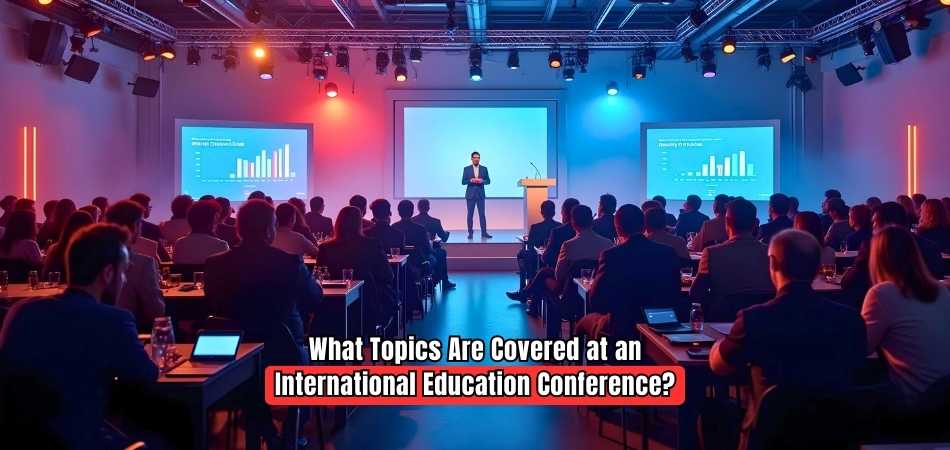International education conferences are essential gatherings that unite educators, researchers, and policymakers from around the globe. These events facilitate the sharing of knowledge and experiences, allowing participants to engage in meaningful discussions about current issues in education. You might be wondering, “What topics are covered at an international education conference?”
These conferences typically cover a wide range of topics, including best practices for curriculum development, trends in educational technology, and strategies for promoting inclusivity. Attendees can also explore global education challenges, networking opportunities, and the importance of professional development.
Are you curious about what specific themes are addressed at these conferences? If so, you’ll find valuable information in this article that covers everything you need to know about the topics discussed at international education conferences.
The Significance of International Education Conferences in Canada
International education conferences play a crucial role in enhancing the educational field in Canada. These events bring together educators, researchers, and policymakers from various backgrounds to share their insights and experiences. By creating collaboration, these conferences help to identify best practices that can be implemented across different educational settings, ultimately improving student outcomes.
Moreover, these conferences provide a platform for discussing pressing issues in education, such as inclusivity, technology integration, and curriculum development. Participants engage in meaningful conversations that encourage innovative solutions to common challenges. The exchange of ideas and strategies contributes to a vibrant community dedicated to advancing education.
Attending these events is invaluable for professionals in the field. Many educators seek out information on upcoming international education conferences in Canada to stay updated on the latest trends and research. By participating in these gatherings, educators not only sharpen their own practices but also contribute to the collective effort to improve education for all learners in the country.
What Topics Are Covered at an International Education Conference?
International education conferences focus on a variety of important topics. These topics help educators, researchers, and policymakers improve education around the world. Here are some of the key themes typically discussed at these conferences.
Best Practices for Curriculum Development
Curriculum development is a major topic at international education conferences. Educators share successful strategies for creating effective curricula. They discuss how to align curriculum with both local and international standards. This ensures that all students receive a quality education that prepares them for the future.
Current Trends in Educational Technology
Technology plays a vital role in modern education. Conferences often explore the latest trends in educational technology. This includes tools like artificial intelligence and online learning platforms. Educators learn how to integrate these technologies into their teaching to increase student engagement.
Global Education Trends and Challenges
International education conferences address pressing global issues. Topics often include access to education and equity for all students. Educators discuss ways to overcome barriers that prevent learning. They share innovative solutions that can be adapted to different contexts around the world.
Networking and Collaboration Opportunities
Networking is a key aspect of these conferences. Attendees have the chance to connect with peers and experts. These connections can lead to future collaborations and projects. Building relationships helps create a supportive community of educators.
Professional Development and Lifelong Learning
Professional development is essential for educators. Conferences offer workshops and sessions that focus on skill enhancement. Participants can learn about new teaching methods and effective practices. This commitment to lifelong learning is vital for improving teaching quality.
Policy and Advocacy in Education
Conferences also discuss important education policies. Policymakers share insights on current challenges in the education system. They explore ways to advocate for effective policies that support students and educators. These discussions help shape the future of education.
Diversity and Inclusion in Education
Diversity and inclusion are essential topics at international conferences. Educators discuss strategies for creating inclusive learning environments. They focus on meeting the needs of all students, regardless of their backgrounds. In this context, the purpose of an international education conference often centers on raising discussions that advance these goals. Sharing experiences helps promote equity in education, enabling practitioners to implement effective, culturally responsive teaching methods.
How to Participate in an Educational Conference?
Participating in an educational conference can be a rewarding experience, but preparation is key to making the most of it. Here are some essential tips to ensure a productive conference experience.
Identify Your Goals
Before attending, take some time to think about what you want to achieve. Are you looking to network, learn about specific topics, or share your own research? Clearly defining your goals will help you focus your efforts during the conference. Knowing what you want to accomplish allows you to choose relevant sessions and make meaningful connections.
Review the Conference Agenda
Familiarize yourself with the conference agenda and schedule. Look for keynote speakers, workshops, and panel discussions that align with your interests and goals. Mark your calendar with the sessions you want to attend to ensure you don’t miss out on valuable opportunities. Planning ahead allows you to maximize your time and make informed choices throughout the event.
Prepare Questions
As you review the agenda, prepare questions for speakers and fellow attendees. Engaging in discussions can deepen your knowledge and provide additional insights. Having questions ready allows you to actively participate and makes networking easier. It also shows your interest and engagement in the topics being discussed.
Network Actively
Take advantage of networking opportunities during the conference. Introduce yourself to other attendees and exchange contact information. Building relationships can lead to future collaborations and discussions beyond the conference. Engaging with peers is crucial for creating a supportive community of educators.
Reflect and Follow-Up
After the conference, take time to reflect on what you learned and how you can implement new ideas in your practice. Follow up with the contacts you made during the event. Sending a brief email or connecting on social media can solidify those relationships. Keeping the conversation going is essential for building a lasting network.
Is Participating in an International Education Conference Worth It?
Participating in an international education conference offers numerous benefits for educators and professionals in the field. Here are some key reasons why attending these conferences is worthwhile.
Enhanced Learning Opportunities
One of the main benefits of attending an international education conference is the chance to learn from experts. Participants can engage in workshops and sessions focused on current trends and best practices in education.
This exposure helps attendees gain valuable insights that can directly upgrade their teaching methods. By learning from leaders in the field, educators can bring new ideas and strategies back to their classrooms.
Networking and Collaboration
Conferences provide a unique opportunity to network with peers and professionals. Meeting others in the field can lead to future collaborations and partnerships. These connections often extend beyond the conference, creating a supportive community of educators. Building a professional network can open doors to new opportunities and resources, enriching one’s career.
Customizable Experiences
International education conferences often feature a wide range of sessions suitable for various interests and expertise levels. This variety allows participants to customize their experience based on their professional development needs. Attendees can choose sessions that align with their specific goals and interests. This personalization increases the overall value of the conference experience.
Financial Considerations
While attending conferences can be beneficial, potential attendees should consider the financial implications. It’s essential to evaluate the cost to attend an education conference in Canada, which typically includes registration fees, travel expenses, and accommodation.
Although these costs can accumulate, many find the investment worthwhile when considering the long-term benefits gained from enhanced skills and networking opportunities.
Long-term Impact
The knowledge and resources gained from conferences can lead to lasting improvements in educational practices. Participants can implement new strategies and share insights with colleagues, positively impacting their institutions. The ripple effect of these experiences contributes to the broader educational community, making the investment in attending a conference invaluable.
Tips for Making the Most Out of Your International Education Conference in Canada
Attending an international education conference offers a unique opportunity to expand your knowledge and network with fellow educators and professionals. To truly benefit from this experience, it’s essential to approach the event with a clear strategy. This section provides practical tips that will help you maximize your conference participation.
- Set Clear Objectives: Determine what you want to gain from the conference. This could be learning new teaching strategies, networking with peers, or exploring specific topics of interest.
- Choose Relevant Sessions: Review the agenda thoroughly and select sessions that align with your objectives. Focus on workshops and keynote speeches that offer insights into your areas of interest.
- Engage With Speakers: Don’t hesitate to ask questions during sessions. Engaging with speakers can provide deeper insights and show your enthusiasm for the topic.
- Utilize Breaks for Networking: Use breaks to connect with other attendees. This informal setting is perfect for making new contacts and discussing shared interests.
- Take Notes: Keep a notebook handy to jot down key takeaways and ideas from sessions. This will help you remember important points and apply them later.
- Explore Vendor Exhibits: Visit vendor booths to discover new resources and tools that can enhance your teaching. Many exhibitors offer valuable materials that could benefit your classroom.
- Participate in Social Events: Attend any social gatherings organized during the conference. These events provide an excellent opportunity to relax and build relationships in a less formal setting.
- Follow Up After the Conference: After the event, reach out to the people you met. Send a quick message expressing your enjoyment of the conference and your desire to stay in touch.
Frequently Asked Questions
This section addresses common inquiries related to attending international education conferences. Understanding these frequently asked questions can help potential attendees explore the events more effectively. Each question is designed to clarify important aspects of participation, ensuring a smooth and rewarding conference experience.
Who Can Attend an International Education Conference?
International education conferences are open to a wide range of participants. Educators, administrators, researchers, students, and anyone interested in education can attend. These events develop collaboration and learning among diverse stakeholders. The inclusive nature improves the experience for all attendees.
What Are the Benefits of Attending an International Education Conference?
Attending an international education conference offers numerous benefits, including networking opportunities, professional development, and exposure to innovative practices. Participants can learn from industry experts and connect with peers. The knowledge gained can significantly upgrade their careers and educational approaches. Overall, these conferences provide a valuable experience for attendees.
Are There Age Restrictions for Attendees?
Generally, international education conferences do not impose strict age restrictions. They welcome individuals of all ages, from students to seasoned professionals. Some conferences may have specific youth programs designed for younger attendees. Always check the event details for any specific guidelines that may apply.
How Should I Prepare for an International Education Conference?
Preparing for a conference involves researching the agenda, setting clear goals, and organizing materials. Familiarize yourself with key sessions and speakers you want to engage with. Packing essentials and planning your travel arrangements in advance will contribute to a smoother experience. Staying organized is key to maximizing your time at the event.
Can Students Attend International Education Conferences?
Yes, students are encouraged to attend international education conferences, especially those studying education or related fields. Many conferences offer discounted rates for students, making participation more accessible. Attending these events allows students to connect with professionals and gain insights into their future careers. It’s a valuable opportunity for their professional growth.
Final Thoughts
International education conferences offer a vibrant platform for sharing knowledge and advancing innovation within the educational sector. These gatherings are instrumental for professionals aiming to broaden their expertise and embrace new methodologies in teaching and learning. The collaboration and exchange of ideas at these events often spark lasting impacts on educational practices worldwide.
In answering “What topics are covered at an international education conference?” attendees can expect a comprehensive exploration of subjects such as curriculum development, educational technology, global education challenges, and diversity and inclusion. These discussions aim to equip educators with the tools necessary to adapt to and lead in the ever-changing educational industry.
To make the most out of attending an international education conference, participants should actively engage in sessions, network with peers, and explore the latest educational tools and resources showcased at the event.








